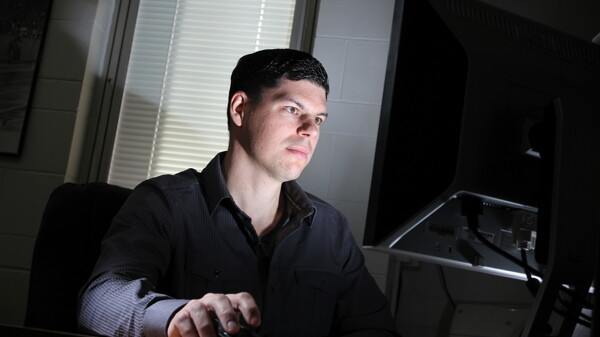Beyond Sticks and Stones
professor’s book trains teens to combat cyberbullying
Ross Lindquist, photos by Andrea Paulseth |

Sitting at her computer, a young girl feels safe. But that may not always be the case. It turns out the people she thought were her friends are not. They message her on Facebook saying they wish she would die. They post on her Instagram photos that she looks fat. Her parents don’t understand why she can’t stay off those sites. The parents say, “Why don’t you just avoid them?” But they don’t realize these sites make up the majority of her social interactions. How can she give that up? She can’t; it’s her world.
And avoiding those sites and bullies won’t stop those so-called friends from saying terrible things online. It just leaves her out of the loop. Classmates see them, but are too nervous to say anything. Forget about sticks and stones breaking bones; these words are a rifle shot to the heart. They are etched in her brain. One in four teenagers have an experience like this. Welcome to the world of cyberbullying.
“I believe that everyone can do something to address this problem.” – UWEC professor and author Justin Patchin, on cyberbullyingJustin Patchin has written multiple books on the subject of cyberbullying. The UW-Eau Claire professor of criminal justice has a lot of advice for teens who may be experiencing cyberbullying or know of it happening. He shares that advice, along with stories similar to the one above, in his new book on cyberbullying, Words Wound. “I believe that everyone can do something to address this problem,” he said.
Even if people don’t want to stand up to bullies, they can still support victims through private messages, reporting indecent behaviors to adults and providing evidence, or by notifying a specific Web service of inappropriate conduct. While all these are great options, they aren’t the perfect solutions.
The interesting twist to what Patchin and writing partner Sameer Hinduja have to say deals with proactive actions that teenagers can use to counteract bullying. In Words Wound, this is called “making kindness go viral.” Justin and Sameer advocate for actions such as tweeting about good deeds, organizing a flash mob with one’s friends to raise awareness about cyberbullying, or creating a school-wide pledge for classmates to sign.
Another smart aspect of this book is its use of self-surveys. Many teenagers will see this book and think that cyberbullying issues don’t apply to them. “I’m not a bully!” some will say, and others will think, “I’m a pretty kind person.” By taking the surveys in this book young adults can see how their actions really measure up. Is she crossing the line with her teasing and “joking around”? And is he really as kind and genuine as he thinks he is online? These important questions can be answered and are discussed in Words Wound.
Words Wound is written with young adults in mind, but has a tremendous amount of value for anyone who deals with teenagers on a regular basis. While there are many true stories used, none of them are graphic in nature. This could be a great book to go through as a family so that these issues are brought to light.
“To my knowledge, this is the first book written for teens on this subject,” Patchin said. He and his co-author have been writing on this subject for many years, but this was their first attempt at writing something non-academic. “I have actually spent time listening to some current music hits to get myself in the right frame of mind for this writing,” Patchin added. The conversational tone and applicable advice is what sets Words Wound apart from other books on the subject of cyberbullying.
Instead of speaking in generalities and possibilities, Words Wound gives specific tools that teens can use to counteract cyberbullying and also concrete ideas to promote kindness. It provides young adults the true stories of the many people who have also dealt with this issue. Quotes from celebrities show the readers that this is a global issue, and that they aren’t the only one going through this. Words Wound is the kind of book young adults have needed for a while, and now they finally have it. Sticks and stones may still break bones, and words still can cut to the core of someone, but people can now take action to heal those wounds.
To learn more, visit wordswound.org. The print edition of Words Wound is available through the website; at Amazon.com; and at The Local Store, 205 N. Dewey St.




















